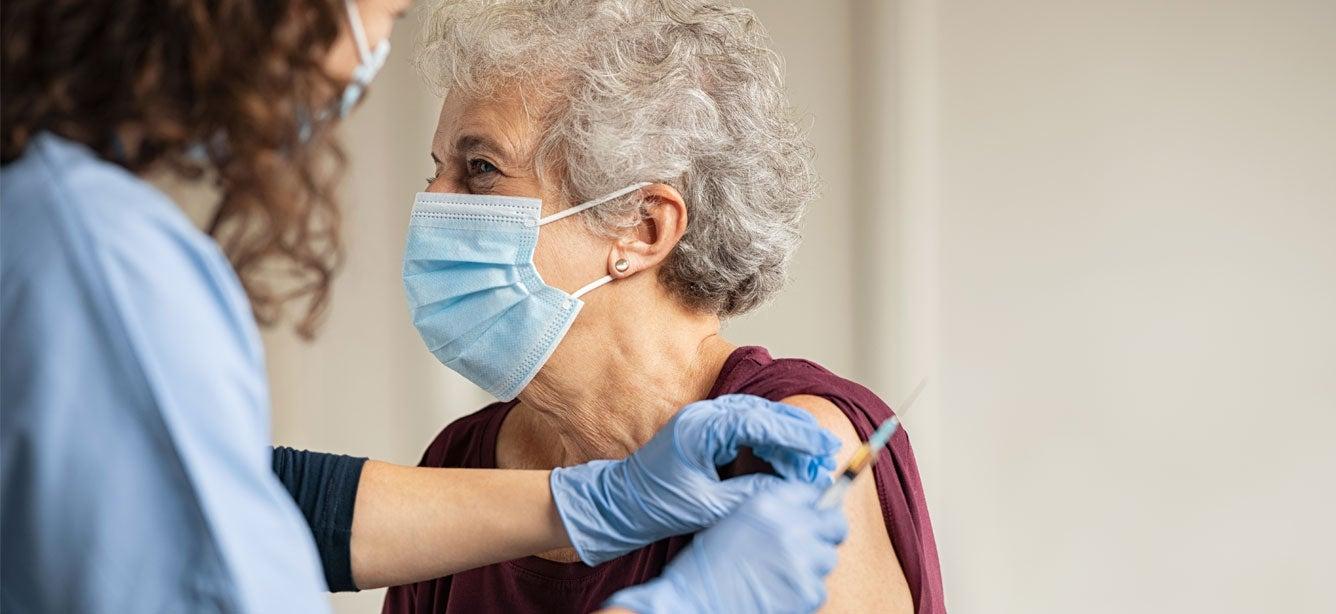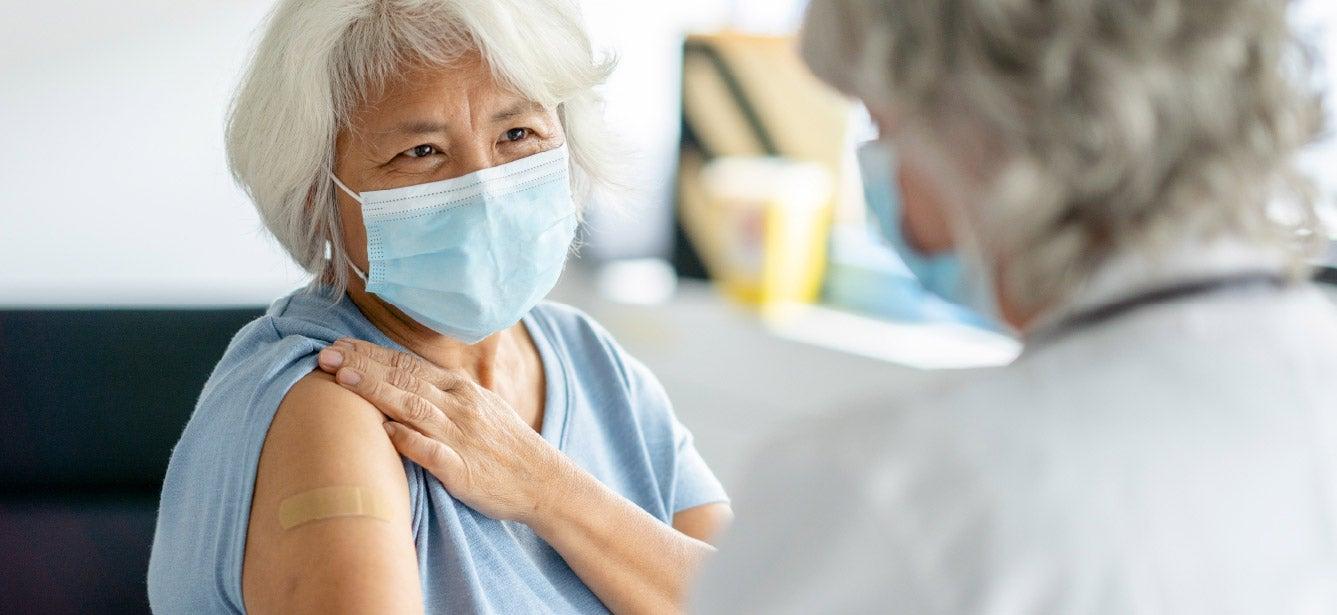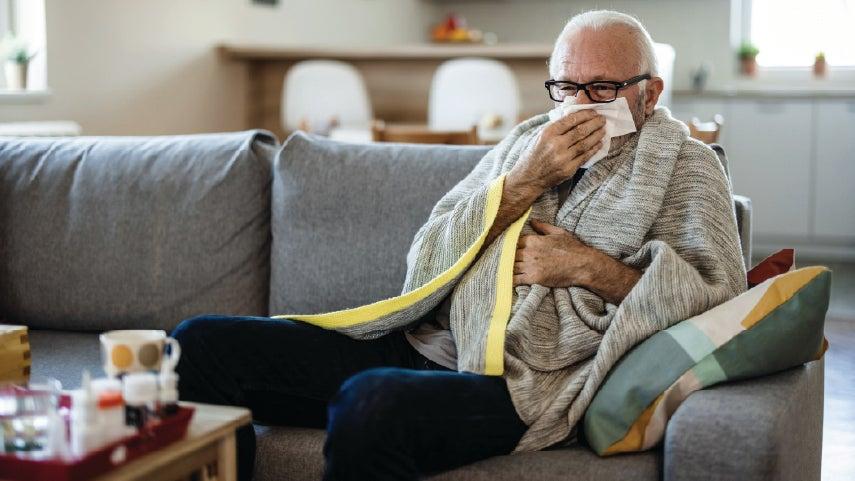
Do dropping temperatures affect our immune system? Recent research revealed that cold temperatures may lower immunity inside the nose, making us more vulnerable to illness and infection. What’s more, cooler weather toughens the outer shell of viruses, making it easier for them to travel from person to person.
Combined with the fact our natural defenses weaken with age, these findings mean winter is a high-risk time for older adults.
The silver lining is that vaccines can help protect us from harmful viruses as we age—throughout winter and beyond. And if you have Medicare, they may cost you nothing out of pocket.
What important vaccines does Medicare cover for older adults?
Below is a list of six vaccines that are 100% covered by original Medicare or Medicare Part D.
Influenza vaccine
- What is the flu? The flu—or influenza—is a contagious respiratory illness that can be severe and life-threatening.
- Why is it important for older adults to get the flu shot? Older people, especially the 93% of adults age 65+ who are managing at least one chronic condition, are more likely to develop complications or become hospitalized with the flu. Flu combined with pneumonia—a common acute condition among the aging population—consistently ranks as one of the top 12 causes of death in the U.S.
According to the Centers for Disease Control and Prevention (CDC), the flu shot prevents millions of illnesses and doctor's visits each year. Getting the shot doesn’t guarantee you won’t get sick—but it does help lower the risk of severe illness, hospitalization, and complications. That protection matters, even in challenging flu seasons where the vaccine isn’t a perfect match to circulating strains. For the 2025-2026 flu season, CDC recommends a flu vaccine for all children, pregnant women, and adults. A higher-dose version of the vaccine is available specifically for older adults—talk to your doctor to see if this option is right for you. - When should you get the flu shot? You should get a flu shot annually. Flu season in the U.S. typically peaks between November and March, so aim to get your vaccine in September or October to prevent contracting the flu from a family member, friend, or caregiver during the holidays. It’s important to note that it does take two weeks after getting the shot for your body to build up full immunity. Did you miss the prime vaccination window? Flu season can peak as late as February or even March—so as long as the virus is still circulating, it’s not too late to get your yearly flu shot.
- Where can you get the flu shot? Your best option for getting the flu shot is to make an appointment with your physician. Your local clinic or drug store may offer the shot, but it’s a good idea to call ahead as some locations do run out of the vaccine. You can also visit the CDC website for help finding a convenient location to get this and other vaccines.
- How does Medicare cover the cost of the flu shot? The flu vaccine is a once a year, cost-free Medicare Part B benefit. If you have original Medicare, you must use a physician or health care provider who accepts Medicare. If you have Medicare Advantage, you may have to use an in-network doctor or pharmacy—contact your plan for details.
Shingles vaccine
- What is shingles? Shingles is a painful skin rash that’s caused by the same virus responsible for chickenpox. Shingles is less contagious than chickenpox, and can only be passed on to another person up until the point when the infected person’s blisters begin to scab. Even after shingles passes, long-term pain can linger.
- Why is it important for older adults to get the shingles vaccine? Researchers believe the age-related decline in immunity can trigger the “reawakening” of the dormant chickenpox virus. One in three adults contracts shingles at some point in their life—the majority of whom are 60 years or older. The older you are when you get shingles, the more likely you are to have severe side effects, like fever, exhaustion, and loss of appetite. These can lead to malnutrition, physical deterioration, and/or additional infections. Whether you remember having chickenpox as a child or not, you should still talk to your doctor about getting vaccinated.
- When should you get the shingles vaccine? Older adults are at higher risk for developing shingles, since our bodies have more trouble fighting off infections as we age. CDC recommends that healthy adults age 50 years and older get two doses of Shingrix separated by two to six months. Vaccination is also recommended for some adults age 19 and older who have compromised immune systems. People who are immunocompromised can receive their second dose of Shingrix one to two months after the first dose.
- Note: Shingrix replaced the prior shingles vaccine Zostavax and has been the only shingles vaccine available in the U.S. since November 2020. If you had the Zostavax vaccine previously, you should still get the Shingrix shot. Talk to your health care provider about the best timing to get Shingrix.
- Where can you get the shingles vaccine? Your physician or local pharmacy can administer the shingles vaccine. You can also visit the CDC website for help finding a convenient location to get this and other vaccines.
- Does Medicare cover the cost of the shingles vaccine? Medicare covers a wide range of preventive services, including Shingrix. There is no cost-sharing for all adult vaccines covered under Part D that are recommended by the Advisory Committee on Immunization Practices (ACIP), including Shingrix. If you have Medicare Part D or a Medicare Advantage plan with prescription drug coverage, you should pay nothing out of pocket when you receive this vaccination.
Pneumococcal vaccine
- What is pneumococcal disease? Pneumococcal disease causes severe infections throughout the bloodstream and/or vital organs. While you may not have heard of pneumococcal disease, you have probably heard of the conditions it can cause, including pneumonia (infection of the lungs), meningitis (infection of the lining of the brain and spinal cord), and bacteremia (infection of the bloodstream). Pneumococcal disease can result in deafness, brain damage, loss of limbs, and even death.
- Why is it important for older adults to get the pneumococcal vaccine? Pneumococcal disease claims the lives of 25,400 adults age 50+ each year.1 A weakening immune system means older adults are at greater risk, and can face more severe side effects, especially those who are managing chronic diseases.
- When should you get the pneumococcal vaccine? The pneumococcal vaccine—you may hear people call it the pneumonia vaccine—is two shots given about a year apart. Check with your doctor to see if you’ve had either shot already.
- Where can you get the pneumococcal vaccine? You can usually make an appointment with your doctor to receive the vaccine, or stop by your local clinic or pharmacy. You can also visit the CDC website for help finding a convenient location to get this and other vaccines.
- How does Medicare cover the cost of the pneumococcal vaccine? The pneumococcal vaccine is a cost-free benefit covered by Medicare Part B. If you have Medicare Part B, you must use a physician or health care provider who accepts Medicare. If you have Medicare Advantage, you may have to use an in-network doctor or pharmacy.
RSV
- What is RSV? Respiratory syncytial virus, or RSV, is a common respiratory virus that affects the lungs and breathing passageways. It's highly contagious and typically causes mild, cold-like symptoms.
- Why is it important for older adults to get the RSV vaccine? RSV can cause serious illness in older adults, especially those over 60 or with underlying health conditions like heart or lung disease. The infection can lead to pneumonia, hospitalization, and even death. Getting the RSV vaccine helps reduce the risk of serious complications.
- When should you get the RSV vaccine? Three vaccines are currently approved by the U.S. Food and Drug Administration (FDA) to help prevent severe RSV in adults: GSK's Arexvy, Moderna's mResvia, and Pfizer's Abrysvo single-dose vaccines. These vaccines are recommended by CDC for all adults ages 75 and older and those age 50–74 who are at increased risk for severe RSV. You can get the vaccine at any time, but late summer or early fall is the best time to get it. Keep in mind the RSV vaccine is not something you need every year. If you already got the shot (even last year), you do not need another one right now.
- Where can you get the RSV vaccine? Your doctor, a local clinic, or a drug store can administer the shot. You can also visit the CDC website for help finding a convenient location to get this and other vaccines.
- How does Medicare cover the cost of the RSV vaccine? Medicare covers the RSV vaccine through Medicare Part D. If you have Part D coverage, you should pay nothing out of pocket for this shot, but you may have to use an in-network doctor or pharmacy. Contact your plan for details.
COVID-19 vaccine
- What is COVID-19? COVID is an illness caused by the SARS-CoV-2 virus. It spreads easily from person to person through the air. COVID typically causes mild to moderate symptoms like cough, fever, loss of smell and taste, and fatigue, and for most people resolves in a week or two. But in high-risk populations, COVID can lead to serious complications resulting in hospitalization and death.
- Why is it important for older adults to get the COVID vaccine? Due to a natural decline in immunity as we age, older adults face a greater risk of getting infected with COVID and developing severe complications. This is especially true for those with other health conditions (e.g., diabetes, obesity, cancer), those who’ve never received a COVID vaccine, and those living in long-term care facilities.
Between July 2024 and June 2025, COVID deaths were highest among adults age 65 and older, with rates jumping significantly among those 75 and older (16,375 deaths).2
- When should you get the COVID vaccine? Ask your health care provider about the optimal timing of your COVID shot based on the time of year, your last vaccination, and any recent COVID infections. For everyone age 6 months and older, COVID vaccination is an individual decision to be made with a health care provider.
For adults who are age 65+ or living with conditions like diabetes or heart disease, the COVID vaccine continues to offer powerful protection against severe illness, hospitalization, and death. NCOA recommends that older adults talk to their provider about their personal risks and get vaccinated to protect their health, independence, and quality of life. - Where can you get the COVID vaccine? You can usually get vaccines at your doctor’s office, a community health center, or your local pharmacy (depending on your state). Check your pharmacy’s website to see if appointments are available—some locations may also accept walk-ins. You can also reach out to your state health department for more information. If you need help getting a COVID vaccine, dial 211 or contact organizations that support older adults and people with disabilities:
- The Aging Network: 1-800-677-1116
- Eldercare Locator: Search by ZIP code at eldercare.acl.gov
- Disability Information and Access Line (DIAL): 1-888-677-1199 or email DIAL@n4a.org
- Medicare hotline: 1-800-633-4227 (TTY 1-877-486-2048)
- How does Medicare cover the cost of the COVID vaccine? Medicare covers the COVID vaccine through Medicare Part B. If you have original Medicare, you will pay nothing out of pocket as long as you visit a doctor or pharmacy that accepts Medicare assignment. If you have a Medicare Advantage plan, you generally must get the vaccine from a health care provider or pharmacy that is in your plan's network.
Hepatitis B vaccine
- What is the hepatitis B virus? Hepatitis B (or hep B) is a contagious virus that infects the liver. Acute hep B, which usually lasts a few weeks, often mimics symptoms similar to the flu, like fever and nausea. Chronic hep B is long-term, often has no symptoms at all, and can cause liver damage or death.
- Why is it important for older adults to get the hepatitis B vaccine? The liver and its function change as you age, making hep B more prevalent among older adults. Your risk of contracting hepatitis B increases if you have hemophilia, end-stage renal disease (ESRD), diabetes, or other conditions that lower resistance to infection. Acute hep B is particularly dangerous for older adults because there is no specific treatment for the symptoms.
- When should you get the hepatitis B vaccine? The hepatitis B vaccine is typically given in a series of two or three injections, depending on the specific vaccine. Most Americans are vaccinated against hepatitis B as infants. If you are not sure if you’ve been vaccinated or if you are in a situation where you may need to update your vaccination, contact your doctor.
- Where can you get the hepatitis B vaccine? Your doctor, a local clinic, or a drug store can administer the shot(s). You can also visit the CDC website for help finding a convenient location to get this and other vaccines.
- How does Medicare cover the cost of the hepatitis B vaccine? Medicare Part B insurance covers the full cost of the hep B vaccine if (A) a doctor determines that you are at high or medium risk of contracting the hep B virus, and (B) the physician or health care provider administering the vaccine accepts Medicare. Consult your doctor to determine your risk of getting hep B.
Make a plan to get vaccinated today
Getting vaccinated is an important part of staying healthy as you age—and it also helps protect the health of your friends and family. If you have Medicare, you may pay nothing for recommended vaccines depending on the type of coverage you have. Check with your Medicare plan for specific coverage details and requirements.
Sources
1. Daniel Cheong, et al. Pneumococcal disease burden in high-risk older adults: Exploring impact of comorbidities, long-term care facilities, antibiotic resistance, and immunization policies through a narrative literature review. December 4, 2024. Found on the internet at https://pmc.ncbi.nlm.nih.gov/articles/PMC11622649/
2. CDC National Center for Immunization and Respiratory Diseases. Current Epidemiology of COVID-19. June 25, 2025.



